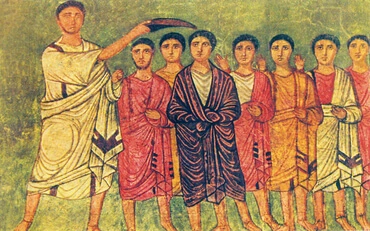1
Och HERREN talade till Mose och sade:
2
»När den första månaden ingår, skall du på första dagen i månaden uppsätta uppenbarelsetältets tabernakel.
3
Och du skall däri sätta vittnesbördets ark och hänga förlåten framför arken.
4
Och du skall föra bordet ditin och lägga upp på detta vad där skall vara upplagt; och du skall föra ditin ljusstaken och sätta upp lamporna på den.
5
Och du skall ställa det gyllene rökelsealtaret framför vittnesbördets ark; och du skall sätta upp förhänget för ingången till tabernaklet.
6
Och brännoffersaltaret skall du ställa framför ingången till uppenbarelsetältets tabernakel.
7
Och du skall ställa bäckenet mellan uppenbarelsetältet och altaret och gjuta vatten däri.
8
Och du skall sätta upp förgårdshägnaden runt omkring och hänga upp förhänget för porten till förgården.
9
Och du skall taga smörjelseoljan och smörja tabernaklet och allt vad däri är och helga det jämte alla dess tillbehör, så att det bliver heligt.
10
Du skall ock smörja brännoffersaltaret jämte alla dess tillbehör och helga altaret; så bliver altaret högheligt.
11
Du skall ock smörja bäckenet jämte dess fotställning och helga det.
12
Därefter skall du föra Aron och hans söner fram till uppenbarelsetältets ingång och två dem med vatten.
13
Och du skall sätta på Aron del heliga kläderna, och smörja honom och helga honom till att bliva präst åt mig
14
Och du skall föra fram hans söner och sätta livklädnader på dem.
15
Och du skall smörja dem, såsom du smorde deras fader, till att bliva präster åt mig. Så skall denna deras smörjelse bliva för dem en invigning till ett evärdligt prästadöme, släkte efter släkte.
16
Och Mose gjorde detta; han gjorde i alla stycken såsom HERREN hade bjudit honom.
17
Så blev då tabernaklet uppsatt i första månaden av andra året, på första dagen i månaden.
18
Då satte Mose upp tabernaklet. Han lade ut dess fotstycken, ställde fast dess bräder, sköt in dess tvärstänger och satte upp dess stolpar.
19
Och han bredde täckelset över tabernaklet och lade ovanpå täckelset dess överdrag allt såsom HERREN hade bjudit Mose.
20
Och han tog vittnesbördet och lade det in i arken och satte stängerna på arken; och han satte nådastolen ovanpå arken.
21
Sedan förde han arken in i tabernaklet och satte upp förlåten som skulle hänga framför arken, och hängde så för vittnesbördets ark, allt såsom HERREN hade bjudit Mose.
22
Och han satte bordet i uppenbarelsetältet, vid tabernaklets norra sida, utanför förlåten,
23
och lade upp på detta de bröd som skulle vara upplagda inför HERRENS ansikte, allt såsom HERREN hade bjudit Mose.
24
Och han ställde ljusstaken in i uppenbarelsetältet, mitt emot bordet, på tabernaklets södra sida,
25
och satte upp lamporna inför HERRENS ansikte, såsom HERREN hade bjudit Mose.
26
Och han ställde det gyllene altaret in i uppenbarelsetältet, framför förlåten,
27
och antände välluktande rökelse därpå, såsom HERREN hade bjudit Mose.
28
Och han satte upp förhänget för ingången till tabernaklet.
29
Och brännoffersaltaret ställde han vid ingången till uppenbarelsetältets tabernakel och offrade brännoffer och spisoffer därpå, såsom HERREN hade bjudit Mose.
30
Och han ställde bäckenet mellan uppenbarelsetältet och altaret och göt vatten till tvagning däri.
31
Och Mose och Aron och hans söner tvådde sedermera sina händer och fötter med vatten därur;
32
så ofta de skulle gå in i uppenbarelsetältet eller träda fram till altaret, tvådde de sig, såsom HERREN hade bjudit Mose.
33
Och han satte upp förgårdshägnaden runt omkring tabernaklet och altaret, och hängde upp förhänget för porten till förgården. Så fullbordade Mose allt arbetet.
34
Då övertäckte molnskyn uppenbarelsetältet, och HERRENS härlighet uppfyllde tabernaklet;
35
och Mose kunde icke gå in i uppenbarelsetältet, eftersom molnskyn vilade däröver och HERRENS härlighet uppfyllde tabernaklet.
36
Och så ofta molnskyn höjde sig från tabernaklet, bröto Israels barn upp; så gjorde de under hela sin vandring.
37
Men så länge molnskyn icke höjde sig, bröto de icke upp, utan stannade ända till den dag då den åter höjde sig.
38
Ty HERRENS molnsky vilade om dagen över tabernaklet, och om natten var eld i den; så var det inför alla Israels barns ögon under hela deras vandring.







